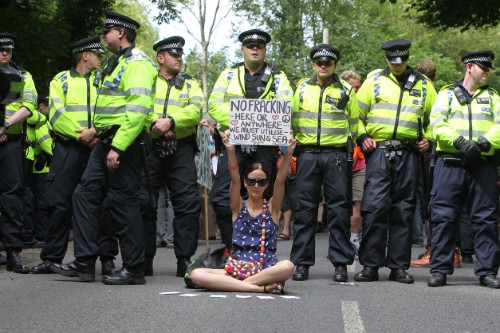
A new report has uncovered the many risks of participating in climate and environmental protests across the world - and how more countries are criminalising and repressing this activity in a bid to keep it in check.
The report, led by the University of Bristol, is the first to examine global statistics on this form of protest and identify alarming trends. It reveals that more than 2,000 climate and environmental protesters have been killed over the past 12 years and that a raft of new anti-protest legislation has been enacted.
It calls for governments, police forces and the legal system to help protect people's right to peaceful assembly and freedom of expression.
Lead author Dr Oscar Berglund, Senior Lecturer in International Public and Social Policy at the University's School for Policy Studies, said: "This research sheds important light on how the growing pursuit of climate and environmental protest is being handled globally. Our evidence clearly shows a global crackdown in liberal democracies as well as autocracies.
"This is worrying because it focuses state policy on punishing dissent against inaction on climate and environmental change instead of taking adequate action on these issues. It also represents authoritarian moves that are inconsistent with the ideals of vibrant civil societies in liberal democracies."
The findings showed murders and disappearances of climate and environmental activists are common in many countries, with international non-governmental organisation (NGO) Global Witness reporting at least 2,106 killings between 2012 and 2023. Brazil had the highest number with 401 fatalities, followed by 298 in the Philippines, 86 in India, and 58 in Peru.
A significant proportion of climate and environmental protests involved arrests, according to the research. The highest proportion, one in five, was found in Australia, followed by 17% in the UK – much higher than the international average of 6.3%.
Non-violent protesters were also found to be given lengthy prison sentences to act as a deterrent. For example, this year in the UK many climate activists have been sent to prison, with the longest sentence being five years.
The report defines environmental protests as being aimed at stopping specific environmentally destructive projects, such as fossil fuel exploration and extraction, deforestation, dam building or mining. Climate protests are described as more urban-based events, which tend to have broader policy demands, such as ending oil exploration, or more overarching political demands, for instance enacting a Green New Deal.
The researchers analysed data from the Armed Conflict Location & Event Data (ACLED) and Global Witness to gather global data and explore trends as well as new anti-protest legislation introduced in countries in different parts of the world.
Four main ways were identified to criminalise and repress climate and environmental protests. Anti-protest laws are being introduced, criminalising groups, introducing new crimes, making punishment more severe for existing crimes, increasing police powers, and giving officers impunity when harming activists. Protest is also being criminalised through prosecution and courts.
Dr Berglund explained: "This involves using existing legislation, including anti-terror or anti-organised crime laws, to curb protest. Climate protest is being de-politicised in the courts, prohibiting mentions of climate change or environmental damage in proceedings, or otherwise changing court processes in order to increase the likelihood of activists being found guilty."
The third category is through policing, which is carried out not only by state actors like police or military, but also private security and military or organised crime groups. This sees a range of attempts to prevent protests through using stop and search, arrests, physical violence, and threats and intimidation of protesters.
Dr Berglund said: "Perhaps most shockingly, we found killings and disappearances to be common in some countries. In many ways, these are an extension of policing as they are either carried out or permitted by the same authorities, often following death threats and other forms of intimidation."
The report makes numerous recommendations, including for public authorities to conduct regular evaluations and publish data demonstrating how their actions help safeguard the right to peaceful assembly and freedom of expression. It also calls for anti-terror and anti-organised crime legislation against climate and environmental activists to stop.
Dr Berglund said: "Human rights frameworks should be at the forefront of policing considerations and operations to ensure that the public can exercise their right to protest without impediment or fear.
"Climate and environmental protests are increasingly prevalent, for good reason as the climate crisis worsens, and responses to this activity are evolving at pace. Further research is needed to better understand the situation so suitable measures can be identified and implemented to protect human rights and keep protesters safe."
Paper
''Criminalisation and repression of climate and environmental protests' by O. Berglund et al.






